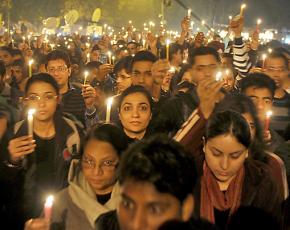Harvard helps the less fortunate
Globally, from the U.S. to the developing world, rape and other forms of violence against women remain at shockingly high levels. Focusing on the horrifying case of a 23-year-old Indian student who was gang-raped and beaten to death in Delhi in December, the Harvard College Women's Center announced it would create a Beyond Gender Equality task force, "convened to offer recommendations to India and other South Asian countries in the wake of the New Delhi gang rape and murder."
The group ignored the long history of Indian activists themselves fighting to end rape and sexual violence--including recent mass protests of South Asian women and men calling for a systemic fight against rape. And the Harvardites had nothing to say about the ample evidence of the problem of rape in the U.S.--from the sickening gang rape and subsequent cover-up at Steubenville High School in Ohio, to the systematic downplaying of rape and sexual assault at Amherst College and other universities.
In response to this "white (wo)man's burden" take on the issue of sexual violence in South Asia, a group Indian feminists wrote the following response, first published at Kafila.org, detailing their own years of work fighting to end rape and gain justice sexual assault victims.
Dear sisters (and brothers?) at Harvard
WE'RE A group of Indian feminists and we are delighted to learn that the Harvard community--without doubt one of the most learned in the world--has seen fit to set up a policy task force entitled "Beyond Gender Equality" and that you are preparing to offer recommendations to India (and other South Asian countries) in the wake of the New Delhi gang rape and murder.
Not since the days of Katherine Mayo have American women--and American feminists--felt such a concern for their less privileged Third World sisters. Mayo's concern, at that time, was to ensure that the Indian state (then the colonial state) did not leave Indian women in the lurch, at the mercy of their men, and that it retained power and the rule of the just.
Yours, we see, is to work towards ensuring that steps are put in place that can help the Indian state in its implementation of the recommendations of the Justice Verma Committee, a responsibility the Indian state must take up.
This is clearly something that we, Indian feminists and activists who have been involved in the women's movement here for several decades, are incapable of doing, and it was with a sense of overwhelming relief that we read of your intention to step into this breach.

You might be pleased to know that one of us, a lawyer who led the initiative to put pressure on the Justice Verma Committee to have a public hearing with women's groups, even said in relief, when she heard of your plans, that she would now go on holiday and take a plane ride to see the Everest.
Indeed, we are all relieved, for now we know that our efforts will not have been in vain: the oral evidence provided by 82 activists and organizations to the Justice Verma Committee--and which we believe substantially contributed to the framing of their report--will now be in safe American hands!
Perhaps you are aware that the Indian state has put in place an "Ordinance on Sexual Assault" that ignores many recommendations of the Justice Verma Committee? If not, we would be pleased to furnish you a copy of the Ordinance, as well as a chart prepared by us, which details which recommendations have been accepted and which not.
This may be useful in your efforts to advise our government. One of the greatest things about sisterhood is that it is so global--feminism has built such strong international connections, such that whenever our First World sisters see that we are incapable of dealing with problems in our countries, they immediately step in to help us out and provide us with much needed guidance and support. We are truly grateful for this.
Perhaps you will allow us to repay the favor, and next time President Obama wants to put in place legislation to do with abortion or the Equal Rights Amendment, we can step in and help, and, from our small bit of experience in these fields, recommend what the United States can do.
Vrinda Grover (mere lawyer)
Mary E. John, Senior Fellow, Centre for Women's Development Studies, New Delhi
Kavita Panjabi, Professor of Comparative Literature, Jadavpur University, Kolkata
Shilpa Phadke, Assistant Professor, School of Media and Cultural Studies, Tata Institute of Social Sciences, Mubmai
Shweta Vachani, Senior Editor, Zubaan
Urvashi Butalia, Director, Zubaan
and many others
First published at Kafila.org.


